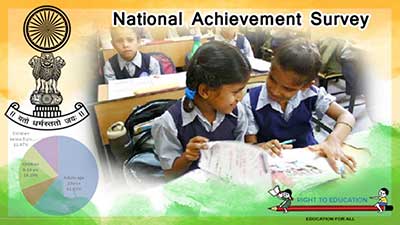Relevance: GS-2: Issues relating to development and management of Social Sector/Services relating to Health, Education, Human Resources
Key Phrases: National Achievement Survey, Magnitude of the Learning Crisis, Annual State of Education Report, National Education Policy, Pedagogical Challenges, Degradation in Children's Foundational Skills, Public Health Emergency, Digital Divide
Why in News?
- The National Achievement Survey (NAS) commissioned recently details the magnitude of the learning crisis across the country.
- With social and economic activity returning to near normal after the pandemic, one of the critical challenges is to extend the post-Covid recovery to the classroom.
- The Union Education Ministry has said that the NAS data “will help states in taking remedial measures, both short-term and long-term”.
Key highlights of the survey:
- Conducted in November 2021 among students of more than one lakh schools in 720 districts, the NAS shows a sharp dip in the performance of students in almost all subjects during the pandemic years.
- Worryingly, the survey reveals that the breakdown affected even states that traditionally do well on educational parameters.
- The average scores of Delhi's Class V students in mathematics, for instance, were well below the national average.
National Achievement Survey (NAS) 2021 report
- The Department of School Education and Literacy, Ministry of Education released the National Achievement Survey (NAS) 2021 report which assesses the health of the school education system in the country by conducting a comprehensive evaluation survey of children’s learning competencies in classes III, V, VIII, and X with a cycle period of three years.
- It reflects the overall assessment of the school education system. The last NAS was held in 2017.
- The NAS 2021 was held on 12.11.2021 at all India level and covered (a) Government Schools (Central Government and State Government); (b) Government Aided Schools; and (c) Private Unaided Schools.
- About 34 lakh students of 1.18 lakh schools in 720 districts from both rural and urban areas have participated in NAS 2021.
Impact of Pandemic on the school education of children:
- India witnessed one of the longest school closures in the world.
- Teachers have struggled to cope with the pedagogical challenges posed by switching to online classes.
- The country's digital divide proved to be a hurdle for a large number of underprivileged learners.
- Field reports by private agencies and state government bodies have indicated that this disruption resulted in an alarming degradation in children's foundational skills i.e., reading, writing, and doing simple mathematics.
- The public health emergency had suspended the implementation of school education reforms envisaged by the NEP.
- Funds for training teachers have been slashed by nearly 50 percent in the current budget and the outlay for the Mid-Day Meal Scheme has come down by almost 10 percent whose positive impact on school enrollment, student retention, and nutrition of children is well-documented
- Instead, there seems to be an over-reliance on e-learning. But as the NAS shows, these methods cannot be a substitute for the interactions in a classroom.
Way Forward:
- Acknowledgment of Setbacks and Diminished skills:
- The first step should be to acknowledge that children are returning to schools with diminished skills as well as to recognize that some learners may have experienced more setbacks than their peers.
- Shifting Pedagogical Practices to Learner-Centric methods:
- Planners and school administrators should give teachers the freedom to adopt creative approaches that turn classrooms into spaces where students can relieve the anxieties of the past two years and regain skills at their own pace.
- This would require re-imagining pedagogical practices and a shift from syllabus-centred approaches of the past to learner-centric methods.
- The New Education Policy 2020, announced in the first year of the pandemic, recognises this imperative.
Conclusion:
- Several studies, including the annual ASER reports, have underlined that most of the failings of the country's educational system stem from the lack of connect between the lived experiences of most students and what is taught in classrooms.
- The pandemic-induced crisis is no doubt alarming but is an opportunity to apply correctives.
- Failure to do so will imperil the academic future of an entire generation.
Source: The Indian Express
Mains Question:
Q. The National Achievement Survey (NAS) commissioned recently details the magnitude of the learning crisis across the country. In this respect, discuss the impact of the pandemic on school education as well as corrective actions needed to reverse the pandemic-induced crisis in the education system of the country. (250 words).








